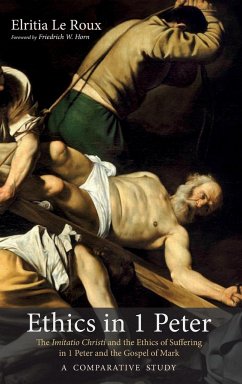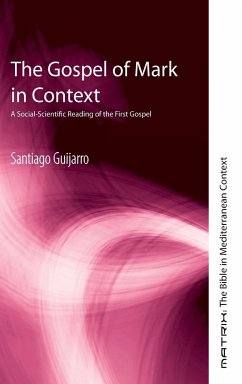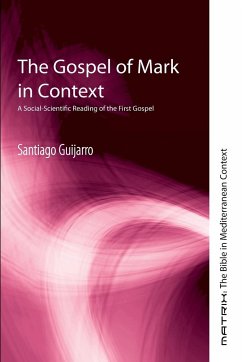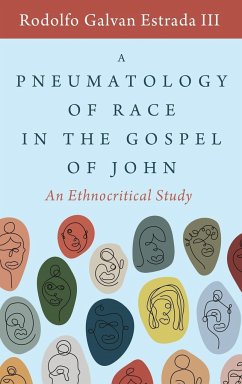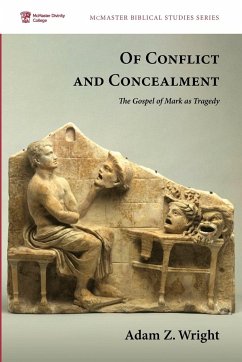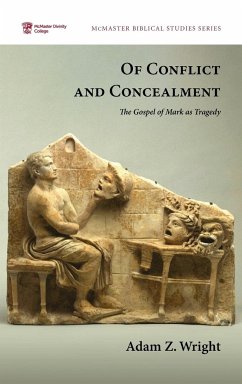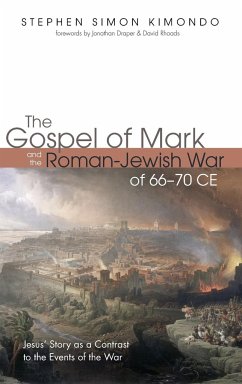
The Gospel of Mark and the Roman-Jewish War of 66-70 CE
Versandkostenfrei!
Versandfertig in 1-2 Wochen
40,99 €
inkl. MwSt.
Weitere Ausgaben:

PAYBACK Punkte
20 °P sammeln!
This book interprets Mark's gospel in light of the Roman-Jewish War of 66-70 CE. Locating the authorship of Mark's gospel in rural Galilee or southern Syria after the fall of Jerusalem and the temple, and after Vespasian's enthronement as the new emperor, Kimondo argues that Mark's first hearers--people who lived through and had knowledge of the important events of the war--may have evaluated Mark's story of Jesus as a contrast to Roman imperial values. He makes an intriguing case that Jesus' proclamation as the Messiah in the villages of Caesarea Philippi set up a deliberate contrast between ...
This book interprets Mark's gospel in light of the Roman-Jewish War of 66-70 CE. Locating the authorship of Mark's gospel in rural Galilee or southern Syria after the fall of Jerusalem and the temple, and after Vespasian's enthronement as the new emperor, Kimondo argues that Mark's first hearers--people who lived through and had knowledge of the important events of the war--may have evaluated Mark's story of Jesus as a contrast to Roman imperial values. He makes an intriguing case that Jesus' proclamation as the Messiah in the villages of Caesarea Philippi set up a deliberate contrast between Jesus's teaching and Vespasian's proclamation of himself as the world's divine ruler. He suggests that Mark's hearers may have interpreted Jesus' liberative campaign in Galilee as a deliberate contrast to Vespasian's destructive military campaigns in the area. Jesus's teachings about wealth, power, and status while on the way to Jerusalem may have been heard as contrasts to Roman imperial values; hence, the entire story of Jesus may have been interpreted an anti-imperial narrative. ""Carefully researched and clearly written, Kimondo's book stands at the nexus of historiography, postcolonial theory, and rigorous textual analysis. Sober in its conclusions even as it is wide-ranging in its implications for the field, this book will be of deep interest to New Testament scholars as well as those seeking to learn from anti-imperial discourses of the past for the purposes of faithful resistance in the present. Highly recommended."" --Robert Saler, Christian Theological Seminary, Indianapolis ""In my work with the Bible in local communities of the poor and marginalised there is an immediate resonance with almost any section of the Gospel of Mark. Kimondo offers us a compelling analysis of why this is the case, providing a detailed interpretation of Mark as 'good news' for the economically oppressed in the context of war and empire. Mark's Jesus offers an egalitarian alternative to the ruling elites of both Jerusalem and Rome."" --Gerald West, University of Kwazulu-Natal ""Stephen Kimondo makes the case that Mark's gospel should be read simultaneously with the Jewish historian Josephus. Aspects of Mark's gospel make the most sense when read in the context of the Roman-Jewish War of 66-70 CE, including comparisons between Rome's bloody empire and God's life-giving rule, Jesus' activity as a campaign compared to Vespasian's campaign in Galilee, and the values of God's empire taught and embodied by Jesus compared to values shown by Roman authorities. Kimondo's mastery of both Josephus and Mark is a gift to students and teachers alike."" --Peter Perry, Fuller Theological Seminary ""In a carefully organized way, Kimondo's book has successfully made a contrast between the violent and pompous Vespasian military campaigns and entrances in cities, that were celebrated to be 'good news', as depicted by Josephus, and the redemptive, non-violent good news without splendor associated with the onset of God's empire, based on the proclamation, teachings, and redemptive deeds of Jesus as depicted by Mark's gospel. This book is well-presented, insightful, and worth the read of any New Testament scholar interested in studies of the early church."" --Elia Shabani Mligo, Teofilo Kisanji University, Mbeya Tanzania Stephen Simon Kimondo is Lecturer in New Testament studies at the University of Iringa in Tanzania. He received his PhD from the Lutheran School of Theology at Chicago.




